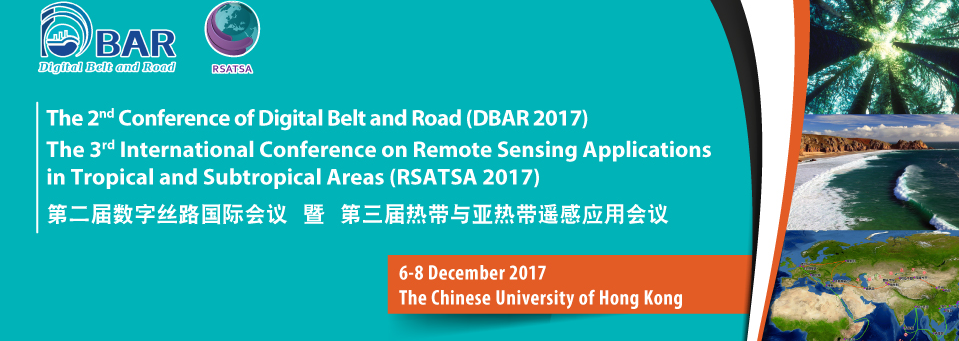
Following a large number of requests, the deadline for papers for the 2nd Conference of the Digital Belt and Road (DBAR 2017) and the 3rd International Conference on Remote Sensing Applications in Tropical and Subtropical Areas (RSATSA 2017) has been extended to 15 August.
The conference will be held in Hong Kong, China, on 6-8 December 2017. Further information is available at http://www.iseis.cuhk.edu.hk/DBAR2017_RSATSA2017/introduction.html
Abstract submissions may be made here: http://www.iseis.cuhk.edu.hk/DBAR2017_RSATSA2017/submission.html
The Belt and Road region covers a vast area and involves over sixty countries and a large population, facing numerous problems related to sustainable development. The combined pressure of climate variability, intensified use of land and marine resources, and the fragility of many ecosystems in the Belt and Road countries make it very challenging to achieve the UN Sustainable Development Goals (SDGs). Therefore, the Digital Belt and Road Programme (DBAR) was initiated in 2016 by the scientists from Chinese Academy of Sciences Institute of Remote Sensing and Digital Earth, aiming to promote cooperation with countries along the Belt and Road to demonstrate and foster the smart uses and applications of “Big Earth Data”, in support of the sustainable development of people and economies at local, national and regional levels. Assessment and monitoring of terrestrial and marine ecosystems require observations that must be precise, accurate, and timely, and measure both objects and processes across a range of spatial and temporal scales. Earth observation technologies have the advantage of macro-level, rapid, accurate monitoring of global and regional environmental changes. They play a significant role in studying resources and the environment and are of great significance for the construction of the Belt and Road.
The DBAR vision is the promotion of international cooperation that integrates Earth observation science, data, technology, and applications to address environmental change and attain SDGs in the Belt and Road region. The uniqueness of DBAR is its goal of building upon the diverse Earth observation capacities in the Belt and Road countries in Asia, Europe, and Africa through comprehensive and well-funded action.
The main topics of the conference are listed at http://www.iseis.cuhk.edu.hk/DBAR2017_RSATSA2017/topics.html
They include:
1: Digital Earth and Spatial Data Infrastructure
2: Remote Sensing for Agriculture Monitoring and Food Security
3: Environmental Monitoring and Analysis for Sustainable Development and Management of Coast and Sea
4: Remote Sensing for Global Environment Change
5: Natural and Cultural Heritage Conservation and Sustainable Development
6: Big Earth Data for Disaster Risk Reduction
7: Remote Sensing for Water Resources
8: Urban Environment and Sustainable Urban Development
9: Observations and Adaption to Changes in High Mountain and Arctic Cold Regions
The eminent keynote speakers are listed here: http://www.iseis.cuhk.edu.hk/DBAR2017_RSATSA2017/speakers.html
